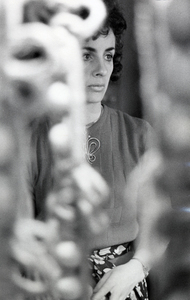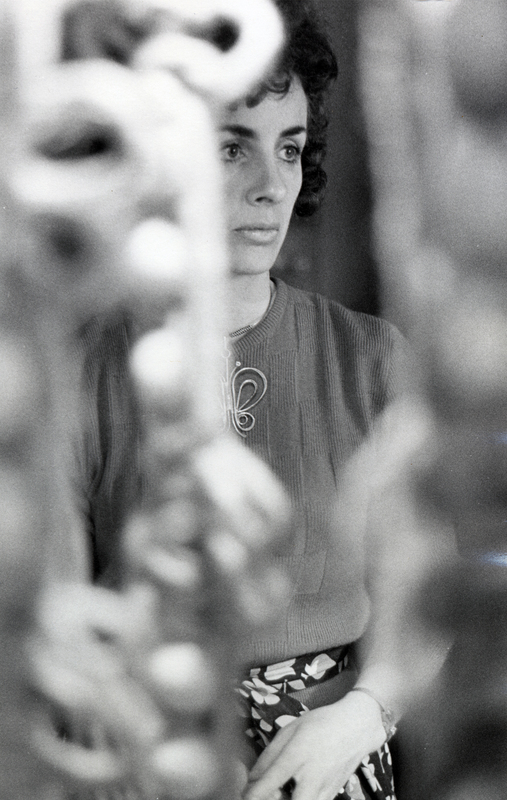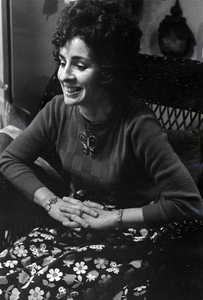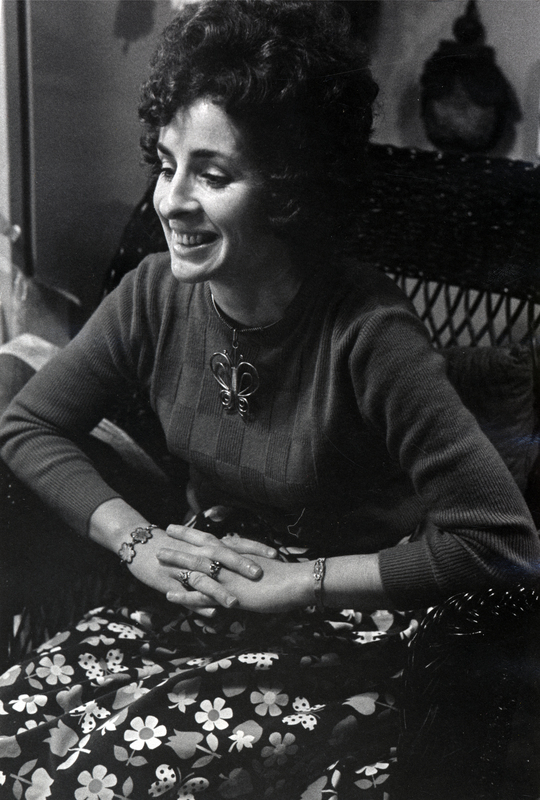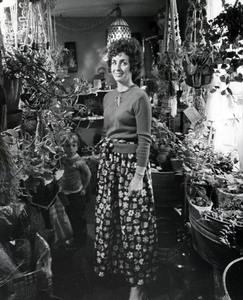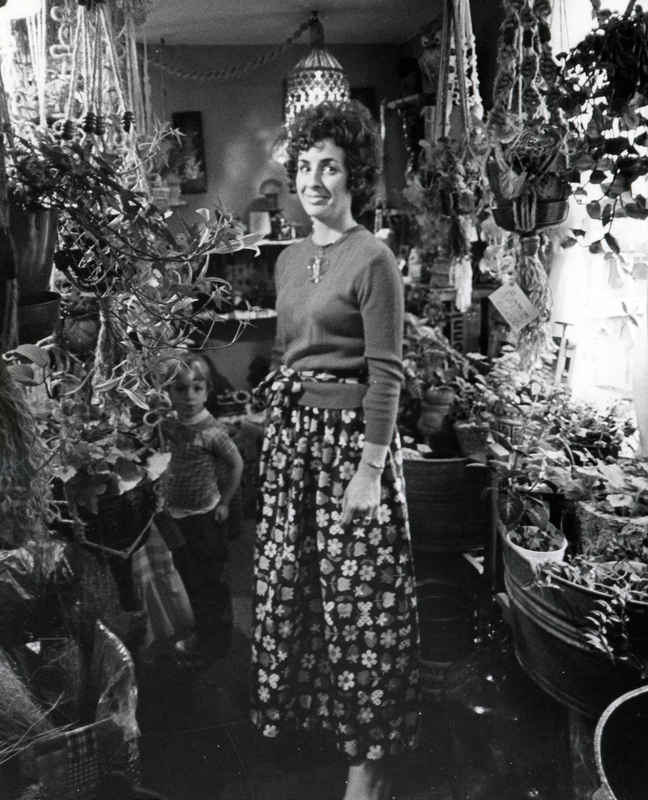Irene Cook Item Info
Irene Cook Interview Audio [transcript]
00:00:00:00 - Unknown Interviewer: $5. You’re looking at your creative.
00:00:08:23 - Irene Cook: And your car.
00:00:09:15 - Unknown Interviewer: And then come back out. All right, so today’s April 24th. We’re in Sandpoint at the Pine Tree. We’re talking to Irene Cook, who is the owner or co-owner of the Pine Tree. And we’d like to, get some of her personal background and how she happened to be in Sandpoint. And, we’ll start out by saying, how long have you lived in Sandpoint?
00:00:32:14 - Unknown Interviewer: For two weeks.
00:00:33:29 - Irene Cook: it’s lived here for.
00:00:39:06 - Irene Cook: Six years. so actually, over just just a little over, actually.
00:00:48:04 - Unknown Interviewer: Anxious. We came from,
00:00:50:29 - Irene Cook: From Santa Cruz.
00:00:51:23 - Unknown Interviewer: County. what what was in your mind when you decided to come to Idaho?
00:00:56:11 - Irene Cook: Okay. My husband worked for Park de Vista, Furnace City coal sales down there, and we had a real nice home and up to us. And about that time, the, university moved in there and there was a lot of problems going on and its taxes were really going. I thought we were thinking of starting a family. We didn’t want to raise a family in that type of environment.
00:01:27:24 - Irene Cook: Apartment was a asked place. I was like, well, so. And so we decided to to, sell our home and we purchased near stream House trailer. You know, we didn’t know where we wouldn’t move or anything. We just started out in there year. We spent about eight months visiting North West and also been to Canada looking for a possible place to live.
00:02:03:11 - Irene Cook: And we spent a lot of time up here and down on the island, up and down. finally we came back through Spokane and we had a brand in Spokane that had moved up who was a pharmacist, 50 Spokane. We were able to visit him, and we did, and we thought, while we’re in Spokane, we’ll take a day and just drive up to the Cortland areas north and look it over.
00:02:37:17 - Irene Cook: We did, and we spent about four days instead of one day. We purchased 50 acres just north of town. Here. So we went back to California, and then we decided we still didn’t know if we wanted them to move up here or not, because our property is went on approved property, which is probably on top. And then we couldn’t believe how or the difference between California and Idaho just been gone.
00:03:13:25 - Irene Cook: It’s long. So we decided to come back and purchase a house near our property and to, purchase an old house, and to fix it up and raise start again and that we actually get enough money, to move up your property. Here’s what got us back. So we purchased this old house that was actually abandoned, and it was a very old dad, repair.
00:03:49:05 - Irene Cook: And,
00:03:50:11 - Unknown Interviewer: We.
00:03:51:09 - Irene Cook: Bought it for almost nothing. And, my husband and I spent months, reading, modeling it, and we parked our Airstream out back here and moved in here while we worked on that house or sales. And we just actually gutted it all out and start all over from scratch. You know, once the house decked, all week windows were broken and the pipes were frozen.
00:04:23:01 - Irene Cook: so we moved rooms around and plumbing around. And it’s major overall.
00:04:29:08 - Unknown Interviewer: You’re in the.
00:04:29:22 - Irene Cook: House.
00:04:30:10 - Unknown Interviewer: So you’ve invested quite a lot of energy and, mostly more energy than money, right. And a lot of time in it.
00:04:37:05 - Irene Cook: Correct.
00:04:38:15 - Unknown Interviewer: but it was worth it to you, right? For one of your values and the things right you wanted that were up here. And it is a better place to raise children, right? Yeah. Yeah. So you must not regret any, you know.
00:04:51:08 - Irene Cook: No.
00:04:55:15 - Unknown Interviewer: what is your background? Is that you grown up in California, right?
00:04:59:05 - Irene Cook: I was was, was raised on the Apple ranch.
00:05:03:27 - Unknown Interviewer: so your people must have come to California early.
00:05:07:09 - Irene Cook: I mean, it’s a great. It’s a good. It’s great. It’s grand. Parents on my father’s side, moved to California and then on my mother’s side, her people from England. Harry’s moved over.
00:05:32:21 - Unknown Interviewer: From New. So it’s kind of, you see a, continuity there. Maybe people with the same values are getting out. That came your ancestors with those values came early, and then California has kind of changed, right? So if you have inherited those same things you’re looking at, come to Idaho. So there might be a relation, a continuing.
00:05:57:16 - Irene Cook: Right?
00:05:57:29 - Unknown Interviewer: I agree. You have the, one sister in a brother?
00:06:02:26 - Irene Cook: Yes.
00:06:03:18 - Unknown Interviewer: Are they similar to you? Are where are they different?
00:06:06:27 - Irene Cook: Keller Fornia. My brother is, working with my dad on the apple orchard. My folks still have the apple orchard and doing very well with it. And my, sister has her own family in is. Scuse me. It’s it’s working in an office.
00:06:32:05 - Unknown Interviewer: did your husband get back in the pharmacy, or did he try to.
00:06:35:09 - Irene Cook: No, no. so after we moved up here, we, spent most every energy and our money on the house hoping to get it, fixed. Japanese eventually. Sturdy, store in here. And, we ran out of money, and so he decided to go out with the middle of winter and get a job, and, he wanted to get back into his old field, which there were in special.
00:07:17:09 - Irene Cook: There were Pancho openings, but not at that exact time. So he took a job for a while with the gas company driving truck. And about five months after he had a bad accident. So he’s been told disabled from the time and.
00:07:43:15 - Unknown Interviewer: So it was rather fortunate.
00:07:44:19 - Irene Cook: It was fortunate we have the shop.
00:07:47:18 - Unknown Interviewer: Here.
00:07:48:26 - Irene Cook: That we just started. When he had his accident.
00:07:55:14 - Unknown Interviewer: Did you meet resistance from the people in the area when you came here?
00:07:59:11 - Irene Cook: Not really.
00:08:00:19 - Unknown Interviewer: Not really. Has that situation changed? If you were coming now, would that be different?
00:08:06:24 - Irene Cook: Yeah, actually it did. It actually did it. It depends. So I think it’s it’s I think it depends on person’s attitude. You know, if you swarmed towards the people I don’t think there’s much resistance sentiment. You know. But if you start, acting, it’s, it’s like it’s, it’s a little bit better than they are. Like, you know, you’re still in their point, really.
00:08:45:17 - Unknown Interviewer: how do you feel about more people coming from California now?
00:08:49:04 - Irene Cook: I wish they’d stay down there.
00:08:55:14 - Irene Cook: It’s starting to feel it out and bring up all their problems up to I don’t.
00:09:00:23 - Unknown Interviewer: I don’t have.
00:09:02:26 - Irene Cook: One.
00:09:03:11 - Unknown Interviewer: You have one son, one son. And they want more.
00:09:06:25 - Irene Cook: Oh, not right now with the store.
00:09:12:08 - Unknown Interviewer: I from.
00:09:17:13 - Unknown Interviewer: you went to high school. You had some college. Yeah. And you were mostly in art crowd.
00:09:23:15 - Irene Cook: No, I didn’t, I didn’t I didn’t, study hardly any of art in college, so I didn’t study hardly any art high school. I just picked it up on my own. And then. Then after high school, I did take private lessons. But how? We started with, in its college, it took mostly courses like in college and psychology, those type of things as demand.
00:09:58:20 - Unknown Interviewer: Do you find many people up here like you with, with similar values? Have you made friends here or whatever? Yes. You don’t feel isolated or alienated from? Do you miss anything from the big city?
00:10:13:04 - Irene Cook: Yes. is it swings. It’s miss the culture. I was like.
00:10:19:20 - Unknown Interviewer: Yeah, you go to Spokane, so that kind of thing.
00:10:24:13 - Irene Cook: Once in a while.
00:10:27:29 - Unknown Interviewer: Is you see anything changing that there’s, a movement coming back, coming to Sandpoint with any of those things or any way to develop it here?
00:10:36:22 - Irene Cook: Yes, yes. Very definitely. Fact. When we moved here, we were the first dart, store. And now after we’ve been here, there’s really there’s it’s, it’s, it’s, it’s many artist craftsman moving in which I think is really good because a lot of potters come in here and.
00:11:02:01 - Unknown Interviewer: These type of people that does it up here to make their life better for the people who are living here originally, do, are they interested in that or.
00:11:11:11 - Irene Cook: So I think.
00:11:11:25 - Unknown Interviewer: So, so that they’re getting some of this expansion and.
00:11:15:20 - Irene Cook: I think it helps them to expose to, you know, I think it runs through scopes on every day.
00:11:23:10 - Unknown Interviewer: so it makes life better for them too. But having them, the people coming in, you’re in, to the natural foods and appreciate that kind of meat, too.
00:11:35:04 - Irene Cook: Yes. They’re hard to find. I any thing in the store that’s already made, I made you scratch.
00:11:44:17 - Unknown Interviewer: We might mention that before you start talking to you, but bread in the oven.
00:11:49:11 - Irene Cook: So I make our own yogurt. I mean, we better drier ground milk, you know, make our own ice cream or legal cheeses. We’re good. I sprout all the time with sprout instead of vines. It’s lettuce and stuff from the store. Please raise your garden. You’re in. Did. Instead of canning, my husband does a lot of drawing on, vegetables and fruits and herbs and stuff.
00:12:23:20 - Irene Cook: We also make, beef jerky. Rejoice that, you know, so making granola breads, we grind your own,
00:12:38:18 - Irene Cook: We grind your own flowers and then I also make fresh, fresh home carrot juice or whatever every day.
00:12:51:01 - Unknown Interviewer: it’s almost as if it’s a subsistence, economy you’ve got going here, right? You do it all right here at home.
00:12:58:16 - Irene Cook: I feel it’s very economical. we don’t use doctor bills or anything, and it really pays off. And I’ve got more stamina, to work in the store. Many people ask. I have always asked, how do I squeeze it in my busy schedule, which is a problem, but I feel if I’m feeling good then I have more time to do more things.
00:13:27:06 - Irene Cook: You know.
00:13:27:26 - Unknown Interviewer: You must be meeting a lot of your psychological and emotional migraines the same time. Keeps you energized.
00:13:33:27 - Irene Cook: Right? hum. and then also helped with me. also, I have before I knew.
00:13:41:24 - Unknown Interviewer: I was gonna go. Okay, Irene stopped to put her bread in the oven. So we’re back asking questions again.
00:13:52:04 - Irene Cook: So I was starting up to mention about the little boy horns I had here finally after childbirth, which, you know, just pays off. And I was busy running them store. And I started going into labor, and I, went to the hospital. My husband’s not able to drive, so I drove him over to hospital and I had horns.
00:14:18:02 - Irene Cook: Anyhow, just an hour after I got there, we stayed there for three hours and I drove home with a little boy. I called and my husband back home, and then I was back running the store. Just a couple days later.
00:14:34:04 - Unknown Interviewer: We. I’m glad you thought that you told about them,
00:14:40:22 - Irene Cook: and he’s never been to a doctor or anything.
00:14:44:19 - Unknown Interviewer: So you did. You you prepared that during your pregnancy, What is it? That type of a delivery. I’m convinced it’s the best way to.
00:14:53:03 - Irene Cook: Go right now. Do you think it’s yoga? good. I work on it every day. They fully jog every morning is mile, mile and a half every morning. And they were all swim transcendental meditation. So we do that also. Morning. Evening helps to calm your nerves and relieves stress. And so it really pays off.
00:15:23:27 - Unknown Interviewer: And, I’m gonna trade places with somebody else so they can ask questions. I know they have. Are you do you want to move them? I might move in here. So it’s like the only question I have is how does your lifestyle differ.
00:15:37:28 - Irene Cook: From in California? Did you do all this in California? Is it in California? This is the reason why. It’s why I got into this. I was, my health was really and it’s it’s real bad state. And I was visiting the doctors all the time. It could be worse and worse. And my speech was really bad and the whole bit.
00:16:02:06 - Irene Cook: And I just felt horrible in California. So it’s just a health risk. Just health. Your outlook by by switching my diet, it didn’t happen overnight. I had to do an awful lot of studying on and on. And then that’s when you’re in this state of health. You don’t get better overnight. You have to work at it. So it really pays off.
00:16:26:27 - Irene Cook: So you look really healthy.
00:16:30:02 - Unknown Interviewer: Are you convincing other people here? Are you try.
00:16:34:24 - Irene Cook: not really real can dancing. But, you know, I like to help other people too. You know?
00:16:45:07 - Unknown Interviewer: Really? Yeah. Well, one thing that I wanted to ask. Well, you had, mentioned the fact that you were raised on an apple farm and now, undoubtedly, I’m almost positive that there were sprays and things connected there.
00:16:59:25 - Irene Cook: Still right.
00:17:01:02 - Unknown Interviewer: Here. Okay, this is what I was wondering about. do you contribute some of your ill health to this, or, how did the rest of your family feel about this and and this sort of thing?
00:17:12:09 - Irene Cook: Maybe there was a slight factor in the air with the springs, My mom is, is is a good cook, and she believes in cooking, you know, with, basic foods and a balanced meals. But I found with my mom, she always all cooked everything. You know, we eat a lot of starches and sweets, which we didn’t know about.
00:17:38:27 - Irene Cook: Mom’s is not into natural foods at all. And my focus during health is going downhill very badly. We only were 50. She and my sister, who’s is is younger than I am, who doesn’t believe in natural foods. Her health is just going downhill really fast to
00:18:02:05 - Unknown Interviewer: What’s one example that they have seen in the chain? They’ve seen you, has this have any effect yet but.
00:18:08:08 - Irene Cook: Has slightly but, you know, healthier families are they’d rather take it from an outsider, someone in the family. but they are making some changes. I can see I was just going to ask what your family thought, if you like them. Were they, upset when you left California? I think so, I think so because we were the only ones out of my family and my husband’s family.
00:18:37:25 - Irene Cook: to leave. But they being out here? Yes. They stayed there any sort of time, though, right? Yeah. Are now how did you learn? I know you said.
00:18:48:11 - Unknown Interviewer: You took art lessons to learn, so painting and so forth.
00:18:52:22 - Irene Cook: And how did you get into, doing all the things that you do homemade in the kitchen? I mean, making pretty well your own butter and making your own ice cream and grinding your own. You can you could choose. Mostly. I just picked it up on my own from books and stuff because I started when I started out on I started out on a Dale Davis book, I don’t know, working on her, her books.
00:19:19:00 - Irene Cook: And that’s what got me started on to natural foods. And then from there I started reading other books and it’s reading now. It’s reading about how they made butter and yogurt. And then I started to doing this.
00:19:35:21 - Unknown Interviewer: you didn’t, make better in this sort of thing in your home when you were growing up.
00:19:41:26 - Irene Cook: You know that we always purchased darce milk from the store, pasteurized milk and all this type of what you do with the raw milk before you do that, you, when you drink it that way. Yes. Yeah. So why do you buy the raw milk first versus the pasteurized milk has been heated or they destroy most the vitamins especially the ends times in it whereas use what’s raw milk.
00:20:21:29 - Irene Cook: None of this has been destroyed. That’s the difference.
00:20:28:07 - Unknown Interviewer: Are you interested in the women’s movement? Are you into that very much?
00:20:32:11 - Irene Cook: To me, these women’s lib? yes and no.
00:20:38:08 - Unknown Interviewer: Would you like to explain that?
00:20:39:10 - Irene Cook: Yeah, actually, actually, I’ve got mixed emotions on it. I feel that, possibly women have been held down, you know, a certain amount and this type of thing. And, so I can understand their points of view on it, you know? But then then I also know who’s been behind them. the people that are being kind, I’m not for them at all, you know?
00:21:22:24 - Irene Cook: So,
00:21:23:12 - Unknown Interviewer: Good to see that. It’s been.
00:21:24:29 - Irene Cook: You can tell that it’s what you’re trying to do. Like they’re they done in many countries is to defy the people like they tried it here was to divide the blacks and whites and try to start spreading lotion with these whites and blacks and they’re working on this now through the women’s movement, trying to divide them, in a certain way.
00:21:58:11 - Irene Cook: The women, will put a split what I think is in these families and, this I’m against, actually. And, most of.
00:22:16:00 - Unknown Interviewer: The.
00:22:16:19 - Irene Cook: Countries that they’ve done any studying at all, it’s where, this communism is taking over. They’ve always divided the people. It doesn’t matter if it’s if it’s white or black or if it’s, it’s landowner against land tillers. Whatever he is, there’s always a division there. And then that’s when they come in and put in work government controls.
00:22:46:22 - Irene Cook: And then you have to have problems.
00:22:50:20 - Unknown Interviewer: So. So you’d be one that would say the era would bring more, Equal Rights Amendment would bring more government control.
00:22:58:01 - Irene Cook: Definitely, definitely.
00:22:59:21 - Unknown Interviewer: And that would be.
00:23:01:22 - Irene Cook: Something against it.
00:23:04:26 - Unknown Interviewer: And,
00:23:06:13 - Irene Cook: And still I’m all for if a woman does the job that a male does, I think this woman ought to have equal pay the whole bit to enforce many of the things that they’re, you know, aiming for. But I, I don’t believe in what the actual end result might eventually end up becoming.
00:23:30:24 - Unknown Interviewer: So there’s military is more government. I definitely think, which would in a way be related to land use planning.
00:23:38:08 - Irene Cook: Right, right.
00:23:39:21 - Unknown Interviewer: What do you think about that issue?
00:23:41:23 - Irene Cook: Because I’m also against it too, because it’s government controls it. What what it is, is government is telling you what you can do with your property and, and always be, to where that is. You’ll be paying taxes on your property, but you won’t have any say as to what you’re allowed to do with that. And they could just move you off your property.
00:24:12:25 - Unknown Interviewer: You feel like that kind of thing should be legislated locally.
00:24:16:03 - Irene Cook: Definitely. Definitely.
00:24:18:21 - Unknown Interviewer: this is.
00:24:20:11 - Irene Cook: Definitely.
00:24:21:19 - Unknown Interviewer: This is really in my own plan.
00:24:23:22 - Irene Cook: Yeah, it’s it’s on a local level. See this this is a problem. We’re getting into schools. Whereas in the old days, we actually had individual states and, then each state had its own and then, within each state you had your own individual county governments or city governments and you, a city or county government legislated, something that you didn’t like.
00:24:59:19 - Irene Cook: You could move into these next county or, for example, if, that all the counties were getting the same through the state government, then you could move to a different state, you know, but now when we have the federal government getting so big that’s imposing all these powers on the states and then eventually down to the local levels, there’s no place, to go back to.
00:25:29:26 - Irene Cook: Everything’s the same. We’re just getting more and more government controls that. I, I believe in with laws and the whole bit, but I think they should be at the local level where the people have a say and you can and know exactly what’s going on. Instead of somebody back in Washington who doesn’t know what’s happening here in your own little area, trying to tell you, for example, just how many carrots you can raise on your property or in this property over.
00:26:08:16 - Unknown Interviewer: we’re we’re and I’m glad you’re telling about this kind of thing. We don’t usually get into that, but it’s related to what we want to know about you and what you think your attitudes. So I’m glad you’re expressing that. But,
00:26:21:07 - Irene Cook: You see the role of women changing? Yes. Yes, definitely. In my view, I think,
00:26:33:22 - Irene Cook: Well, I think women are becoming more involved and we’re in a much more creative hobby. It is, which I think is good.
00:26:48:27 - Unknown Interviewer: So they’re not following the role so much that the accepted role is they do like you and get in touch with your own feelings and think for yourself, And somehow you’re free to try something different. hum. so that’s an advantage.
00:27:05:19 - Irene Cook: Right.
00:27:06:11 - Unknown Interviewer: Now to the degree that they do that, In Savannah. But would you say that if they in the women’s movement, if they, they could go the direction of everyone having to be like, what the women’s lib seems like it would be just reacting.
00:27:23:26 - Irene Cook: Right? Yeah.
00:27:26:12 - Unknown Interviewer: So,
00:27:28:11 - Irene Cook: I feel that the real hard core women’s livers are basically probably, in times, male. Maybe that’s the wrong expression, but I think basically they’re out there out to destroy the family. That’s you. Which was so basically building up this country. This is my opinion.
00:27:56:04 - Unknown Interviewer: Well, certainly you at this time, particularly your husband needs your support a lot.
00:28:01:04 - Irene Cook: Right?
00:28:01:28 - Unknown Interviewer: Right. And You’ve exhibited a lot of strength. And, staying with it and your ideas, I just, I really you’re bringing your family through a hard time, Feel that your husband supported you when you were in your health. It’s sort of like.
00:28:21:08 - Irene Cook: Yeah, yeah. It’s to see someone you.
00:28:35:22 - Irene Cook: Oh. This is also where I think it’s important that women do get out, improve themselves and get a good education and also try to better themselves because it means marriage. And so you, Mike, come up where they’ll have to rely on it. And so I feel that it’s we’re in a woman in the it’s times past many times it’s been held down where she’s had to stay in the home, which I can see advantages also to that too.
00:29:14:27 - Irene Cook: But there’s also disadvantages because now in this day and age, if anything happened to her husband and she’s not skilled, what’s this woman going to do? Okay.
00:29:27:14 - Unknown Interviewer: And it’s certainly as easy to see that in your life. She was fortunate to have the right strength and the flexibility to take care of something. What do women standpoint? Do you get divorced or widowed, or do they get.
00:29:42:15 - Irene Cook: Menial jobs and things? Right? Yeah. Maybe. do I guess probably as maids or waitresses or however, which is, you know, it’s it’s we need those type of people. We need good jobs done. You know, there’s any, real need for it that still, be it’s woman’s wedding prove herself to. You know, it would be also easier on her.
00:30:13:16 - Irene Cook: Wouldn’t have to work as hard and get better paid.
00:30:19:22 - Unknown Interviewer: Well, I would like to continue to talk to you, some more. But we are. You know, we do have to go check out if our our motel. I would like to continue this. We’re hoping to come up here again sometime. Great. And, I feel really lucky to have been able to talk to everybody to take the time off your work.
00:30:39:16 - Unknown Interviewer: Yeah. Yeah.
00:30:41:07 - Irene Cook: Actually, it’s that it’s it’s my pleasure. Really. So.
00:30:46:16 - Unknown Interviewer: Well, we’ll.
- Title:
- Irene Cook
- Date Created (ISO Standard):
- 1976-04-24
- Subjects:
- portraits photographs
- Location:
- Sandpoint, Idaho
- Latitude:
- 48.27646546
- Longitude:
- -116.5537754
- Source:
- MG68, Rural Women's History Project, University of Idaho Special Collections and Archives
- Finding Aid:
- https://archiveswest.orbiscascade.org/ark:/80444/xv42414/
- Type:
- record
- Format:
- compound_object
- Preferred Citation:
- "Irene Cook", Rural Women's History Project, University of Idaho Library Digital Collections, https://www.lib.uidaho.edu/digital/rwhp/items/rwhp105.html
- Rights:
- In copyright, educational use permitted. Educational use includes non-commercial reproduction of text and images in materials for teaching and research purposes. For other contexts beyond fair use, including digital reproduction, please contact the University of Idaho Library Special Collections and Archives Department at [libspec@uidaho.edu](mailto:libspec@uidaho.edu). The University of Idaho Library is not liable for any violations of the law by users.
- Standardized Rights:
- http://rightsstatements.org/vocab/InC-EDU/1.0/

